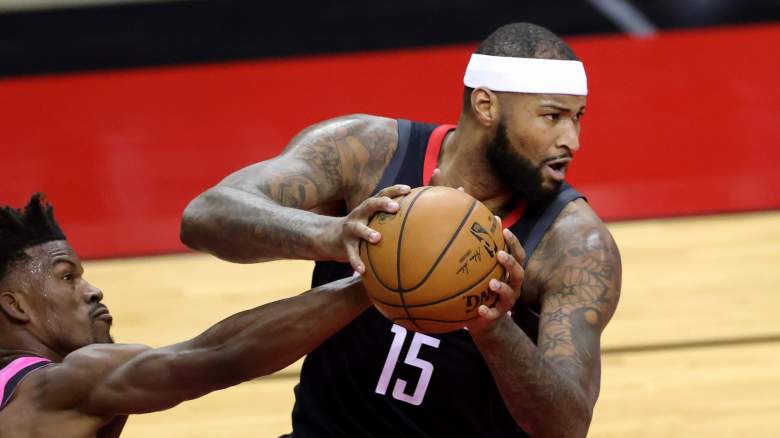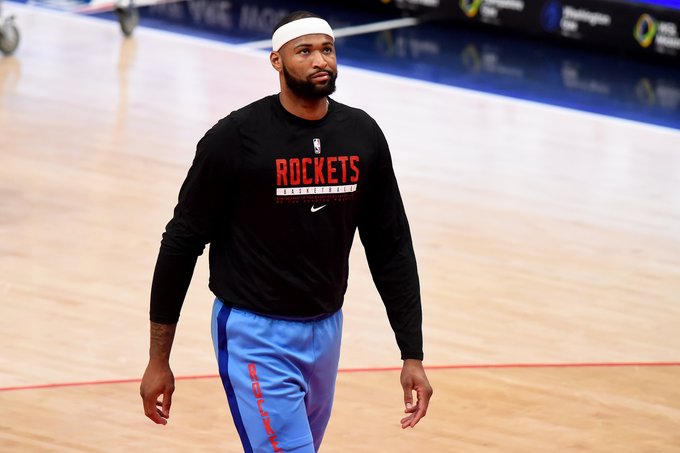
Getty DeMarcus Cousins
As soon as word came down that the Rockets were waiving center DeMarcus Cousins, Lakers fans everywhere perked up. Might this, finally, be the chance to see Cousins in a Lakers uniform in an actual NBA game?
While one initial report suggested the Lakers would have interest, logic and financial reality suggest otherwise. Cousins signed with the Lakers last year, of course, signing on with the team after he recovered from an Achilles tendon tear and showed himself to have some promise during his return with the Warriors.
ALL the latest Los Angeles Lakers news straight to your inbox! Join the Heavy on Lakers newsletter here!
Cousins tore his ACL last summer, though, before he ever suited up for the team. He participated with the Lakers for most of the year but was waived in February. He did receive a championship ring from the team.
Could he help the Lakers win another? We checked in with an assistant coach and two league executives on the possibility of Cousins coming back to the Lakers. The takeaway: It’s far from a sure thing.
The Money is Not There
The Lakers have an open roster spot, but they have only a little more than $912,000 available under the luxury-tax apron. They can’t pay a player any more than that. The good news is that, when paying a prorated minimum salary ($22,500 per game), the Lakers could afford to pay a player for the last 40 games or so of the 2021-22 season, and they will hit that mark this week. They could sign Cousins that way.
The bad news? Other teams—most notably Brooklyn—could pay Cousins significantly more than the minimum. The Heat, Celtics and Blazers, also expected to show interest in Cousins, could as well. This is a problem the Lakers will face with waived players in the coming months.
“If it is about money then that is the problem there for [the Lakers],” one general manager told Heavy.com. “Cousins never got that big second contract in the NBA. He might want to make the most money he can with this, and he can’t make much with the Lakers.”
Cousins got a four-year rookie extension that paid him $62 million over four year, but his last three contract combined have been for $11 million.
Cousins Does Not Fit With Lakers’ Current Bigs
Cousins would be signed as an insurance policy against Anthony Davis’ Achilles injury, which will keep him out until after the All-Star break. But he does not complement the Lakers’ current big men.
The Lakers gave up athleticism around the rim by letting both JaVale McGee and Dwight Howard go in the offseason, bringing in heavy-footed Marc Gasol and undersize Montrezl Harrell to replace them. Signing Cousins—slowed by his own recent injuries—to join that pairing does not make much sense, unless either incumbent is being traded.
There would be a market for Harrell, but he is a Klutch (the agency that represents LeBron James and Anthony Davis) client and the Lakers don’t mess with Kutch clients. At age 36, averaging 4.4 points and 39.6% shooting, there is not much of a market for Gasol.
“Just in terms of the Xs and Os, I don’t see how it goes together,” one Western Conference assistant coach said. “Gasol does not move, he gets killed in pick-and-rolls. Same thing with Boogie. Harrell is small, he does not protect the rim. So you would be adding a guy who has the same holes in his game as your other two, at least defensively.”
The Performance So Far
One thing that gets lost in the fan-driven scramble for Cousins’ services is that he is averaging 9.6 points and 7.6 rebounds in 20.6 minutes played, shooting just 37.6% from the field. He is taking more than half of his shots from the 3-point line, where he is making only 33.6% of them.
He did play much better as a starter than as a reserve lately, but the Lakers probably won’t be comfortable handing a starting spot to a guy who has become a stretch-shooter who can’t shoot so well.
There is also a matter of the playoff experience. The Lakers would like someone they know they could trust in the postseason, and Cousins’ playoff track record—eight games, 7.6 points on 39.6% shooting—is discouraging.
“In the end, you have to think they could do better,” one league executive said. “Cousins is a big name but so what? Can he still play? Is he better than Trevor Ariza or P.J. Tucker or even like a Wayne Ellington, a shooter they need? I don’t see how he can step in and make them better. The Lakers have one shot at finding someone to help and they need to be careful with it. I don’t think signing Cousins is being careful.”
